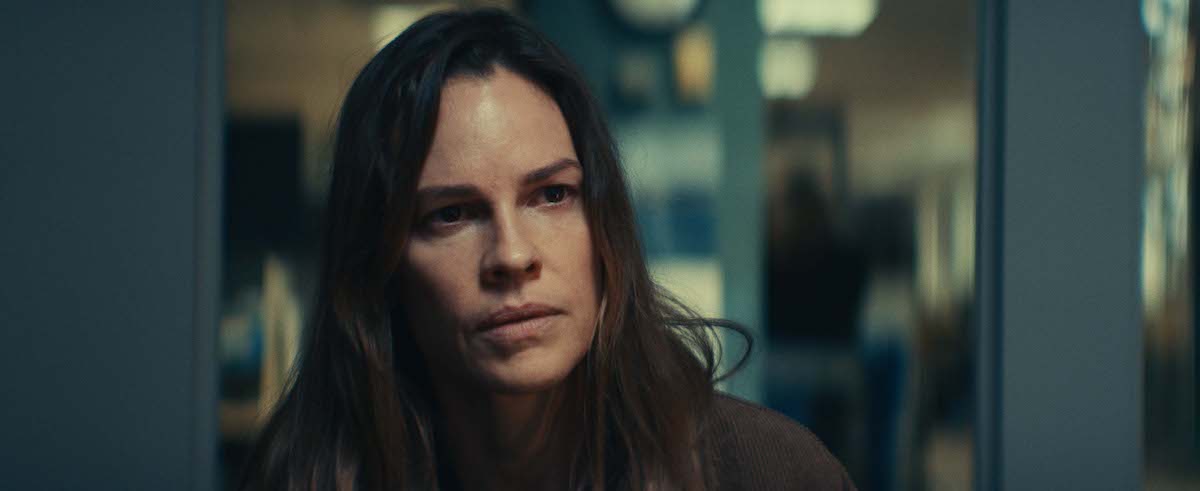“The Good Mother” is the type of movie that could be based on a true story. This downbeat tale takes place in the Rust Belt city of Albany, New York, circa 2016—not the sexiest location, even for a murder mystery that revolves around the opioid crisis. Our lead character, Marissa Bennings (Hilary Swank), is a journalist who works for the Albany Times-Union, suggesting that perhaps the film is based on actual reporting. (It’s not.) But then the big twist comes, and these details are revealed for what they are: credible window-dressing on an incredible plot.
That’s “incredible” in the sense of “too ludicrous to be believed,” not in the awestruck meaning of the word. “The Good Mother” starts depressingly realistic, as Marissa wakes up one morning on her couch with a half-empty bottle on the coffee table in front of her. Hungover and scowling—her default setting, as it turns out—she drags herself into work, where her son Toby (Jack Reynor) interrupts a staff meeting to bring Marissa some terrible news: Her other son, Michael, is dead.
It’s been months since Marissa last spoke to Michael, who alienated his family in the leadup to his death by way of his worsening heroin addiction. It wasn’t the drugs that killed him, but a bullet from an unknown killer in a late-night drive-by shooting. Toby suspects Michael’s best friend, Ducky (Hopper Penn), with whom Michael was involved in shady dealings, pulled the trigger. But Marissa intuits that there’s more going on here than a soured friendship and a drug deal gone awry.
So does Paige (Olivia Cooke), Michael’s girlfriend, who’s now pregnant and alone—except for Marissa, who begrudgingly accepts Paige’s presence in her life after decking her in the jaw at the funeral. The tentative relationship between Marissa and Paige, neither of whom particularly like each other but are bonded by their love for Michael, is the film’s most engrossing aspect. It’s more interesting than their joint investigation into Michael’s death, which sputters and spins before losing its momentum entirely. By the time we find out what really happened to him, “The Good Mother” has already moved on.
This happens about an hour in, with the first of multiple plot developments that set “The Good Mother” on a tawdry new path to an unsatisfying ending. It would be gauche to reveal them here, of course, but they take the story from convincingly bleak to clichéd and ridiculous. These twists are laid atop the realistically textured setting that director Miles Joris-Peyrafitte works so hard to establish in the film’s first two-thirds, invalidating it. Why bother shooting drone footage of sooty highway overpasses and hiring Larry Fessenden to play a grief counselor if you’re going to abandon reality midway through?
That conflict is emblematic of Joris-Peyrafitte’s unfocused approach to directing the film, which is more focused on showy camerawork—some of which is, admittedly, quite striking—than it is on doing right by his characters and their world. Regarding performance, “The Good Mother” has isolated moments that work, but these are also abandoned. Take Karen Aldridge’s moving monologue in a small and thankless role as a member of the aforementioned grief circle: She pours her heart out, gets Swank to the next plot point, and is never seen again. Meanwhile, the players we follow to the end of the story are one-note—Swank particularly so, but Cooke and Reynor don’t get much chance to develop their characters, either.
We never even find out who the “Good Mother” is, although several women in this movie could potentially take the title. Indeed, reality is often frustratingly vague and unresolved, and if “The Good Mother” had committed to this principle, there’d be something worth admiring here, however begrudgingly. As it is, “The Good Mother” starts with a gunshot and ends with a whimper.
Now playing in theaters.




















